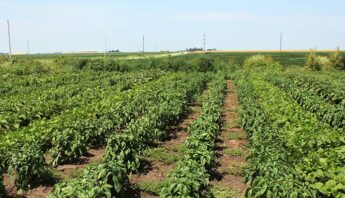In a welcome turn, USDA announced last week that it will take a closer look at new genetically engineered (GE) crops before allowing them on the market. The approval of Dow's 2,4-D-resistant corn and soy, as well as Monsanto's dicamba-resistant soy and cotton, will be put on hold until Environmental Impact Statements are completed.
The decision to conduct a more thorough investigation comes after public outcry from hundreds of thousands of concerned individuals — including farmers. Because if approved, these GE crops will drive a dramatic increase in pesticide use, placing the burden of both increased costs and health risks on farmers and rural communities.
As we've noted before, allowing Dow and Monsanto's new herbicide-resistant products on the market is a bad idea. Scientists warn that widespread planting of 2,4-D corn alone would trigger as much as a 30-fold increase in the herbicide's use by the end of the decade. That pattern would hold true for 2,4-D soy and Monsanto's dicamba-resistant crops as well.
At this point, the earliest these seeds could be available is 2015.
High stakes for farmers & communities
Since both 2,4-D and dicamba are known to drift — directly and through volatilization — increased use poses a very real threat to the livelihood of farmers growing crops that are not engineered to withstand application of these potent chemicals. Conventional farmers could lose crops, while organic farmers could lose both crops and certification. This would result in an economic unraveling of already-stressed rural communities.
As PAN senior scientist Dr. Marcia Ishii-Eiteman points out, farmers are particularly concerned:
"We're hearing from farmers across the country who are extremely worried about USDA's possible approval of these seeds, which are designed to be used with herbicides considered likely to drift, damage crops, threaten farmers' livelihoods and rural communities' health."
Additionally, since 2,4-D is a reproductive toxicant, suspected endocrine disruptor and probable carcinogen, increased use will expose these communities to serious health risks. Children are particularly susceptible to its effects.
A clear message: No, thanks
In December, organic and conventional farmers sent a clear message to USDA chief and Iowa native, Tom Vilsack, that his agency needs to halt the approval of new GE corn and soy crops.
Signaling the damage that increased use of 2,4-D and dicamba could inflict on non-GE crops — especially broadleaf plants like soy — farmers delivered a petition from over 43,000 people from across the country, including more than 1,000 farmers, calling on Secretary Vilsack to “stop the pipeline of new GE seeds.”
The message — from farmers and many, many others — got through. And the latest news that USDA is taking a closer look at the potential harms of these new GE crops is very welcome. While not a final decision, it's a signal that the agency is indeed paying attention to public concern.







